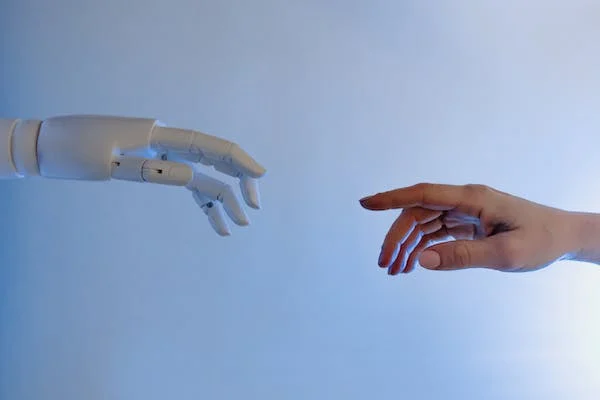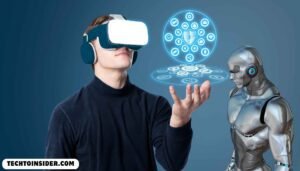Why Artificial Intelligence Is The Future Of Growth
Introduction:
Surely! Artificial Intelligence has the potential to significantly enhance workplace productivity. It’s leading to various benefits for people as they can accomplish more tasks efficiently. As Artificial Intelligence takes over mundane and hazardous tasks, it frees up the human workforce to concentrate on areas where they excel. Such as tasks that demand creativity and empathy, which are difficult to replicate without human insight and understanding. Do you know why artificial intelligence is the future of growth?
In almost every industry, artificial intelligence is profoundly affecting the future of humanity. Additionally, generative Artificial Intelligence exemplified by tools like ChatGPT and Artificial Intelligence art generators has gained widespread recognition and is receiving mainstream attention. As a major technological innovator, artificial intelligence will continue to growth in the near future. Its advancements will shape and revolutionize various aspects of society, driving progress and transformation without the need for pioneers or pilgrims to pave the way.
Table Of Content
- Evolution Of Artificial Intelligence
- AI In Transportation
- Artificial intelligence In HealthCare
- AI In Manufacturing
- Artificial intelligence in education
- The utilization of artificial intelligence in media
- Artificial Intelligence Of customer Care Services
- Future of AI
- Privacy risks Related with artificial intelligence
Evolution Of Artificial Intelligence
AI’s impact on technology is un questionable especially in the realm of work out. With AI, computers possess the remarkable capability to process vast amounts of data and utilize their learned intelligence to make optimal decisions and discoveries at speeds far beyond human capabilities. The journey of AI began in 1951, marked by Christopher Strachey’s groundbreaking achievement of creating an AI computer program—a checkers program that successfully completed an entire game on the Ferranti Mark I computer at the University of Manchester.
Since then, AI has revolutionized numerous fields. For instance, it has played a critical role in sequencing RNA for vaccines and developing human speech models. These applications heavily rely on model and algorithm based machine learning, with a growing emphasis on perception reasoning and generalization. As a result of these changes, artificial intelligence has taken center stage in technology once again, and its fame is only expect to growth in the future.
Artificial intelligence In Transportation
The transportation industry is on the brink of significant transformation due to AI. Self-driving cars and AI travel planners are among the key aspects that will be greatly impacted by AI in our journey from point A to point B. While autonomous vehicles are still far from flawless, they hold the potential to eventually transport us autonomously.
AI In HealthCare
AI is already making significant changes in the healthcare sector, reshaping the way humans engage with medical services.
Leveraging its remarkable big data analysis capabilities, AI plays a crucial role in swiftly and accurately identifying diseases, expediting and simplifying the drug discovery process, and even enabling patient monitoring through virtual nursing assistants. These advancements demonstrate the tremendous potential of AI in revolutionizing healthcare and improving patient outcomes.
Artificial intelligence In Manufacturing
The manufacturing sector has been fulfilling the benefits of AI for several years now. AI-enabled robotic arms and other manufacturing bots have been in use since the 1960s and 1970s, prove the industry’s successful integration of AI capabilities.
These industrial robots usually collaborate with human workers to carry out specific tasks, such as assembly and stacking. Moreover, predictive analysis sensors play a crucial role in maintaining the smooth operation of equipment, ensuring efficient and uninterrupted manufacturing processes. The marriage of AI and manufacturing has resulted in enhanced productivity and optimization within the industry.
AI in Education
AI is set to revolutionize the learning process for individuals of all ages in the education sector. Its utilization of machine learning, natural language processing, and facial recognition facilitates the digitization of textbooks, plagiarism detection, and the assessment of students’ emotions to identify those who may be facing challenges or disengagement. Presently and in the future, AI customizes the learning experience according to each student’s unique requirements, ensuring a more personalized and effective approach to education.
The Utilization Of Artificial Intelligence In Media
AI is making significant inroads into the field of journalism and is expected to continue benefiting it in the future. An excellent illustration of this is The Associated Press’ implementation of Automated Insights, which generates thousands of earning reports stories annually. However, the introduction of generative AI writing tools, like ChatGPT, into the market has sparked inquiries about their role in journalism and their impact on the industry. As these tools become more prevalent, there are ongoing discussions about their responsible and ethical use in journalistic practices.
Artificial Intelligence of customer Care Services
Robo-calls are typically disliked by most people, but the implementation of AI in customer service brings valuable data-driven tools that benefit both customers and providers. AI-powered solutions in the customer service industry manifest as chatbots and virtual assistants. These tools offer meaningful insights and enhance the overall customer experience, enabling efficient and personalized interactions with service providers.
Future Growth of Artificial Intelligence
According to Mendelson, some of the most fascinating AI research with significant implications for the near future revolves around two areas: “reinforcement” learning, which involves rewards and punishment rather than labeled data, and generative adversarial networks (GANs), where computer algorithms can create rather than just assess by pitting two networks against each other. An example of reinforcement learning is Google DeepMind’s AlphaGo Zero, while GANs demonstrate original image or audio generation based on learning about specific subjects like celebrities or particular types of music. On a huge scale, AI is installed to have a profound impact on viable, climate change, and environmental concerns. By utilizing advanced sensors, cities can become less overfull, less polluted, and more livable.
In the years to come, the boots of traffic run and the application of relevant policies and rules will be facilitated by predicting potential issues through data from sensors on cars. This application is still in its early stages but is expected to play a major role in the future.
Privacy risks Related with artificial intelligence
AI’s heavy reliance on big data has uplifted significant concerns about its clash on privacy. Instances such as Cambridge Analytica’s Facebook scandal and Amazon’s. Alexa monitor serve as notable examples of the potential privacy breaking caused by technology. Critics argue that without appropriate regulations and self-imposed limitations, the situation could worsen. In 2015, Apple CEO Tim Cook publicly criticized competitors Google and Meta for engaging in data mining driven by greed. He expressed concerns about companies gathering vast amounts of personal information to monetize it, deeming it morally wrong. Cook emphasized that true intelligence in AI must respect human values, including privacy, and warned about the profound dangers of mishandling this aspect.
Others share these concerns. In a 2018 paper by UK-based human rights and privacy groups Article 19 and Privacy International, anxiety about AI was focused on its everyday applications rather than a doomsday scenario of robot overlords. The authors acknowledged that AI could bring societal benefits if implemented responsibly, but they also highlighted the potential risks of commercial and state use negatively impacting human rights. While the collection of large data sets can have benign applications, such as spam filters and recommendation engines, there is a genuine threat to personal privacy and the right to freedom from discrimination. Striking a balance between utilizing AI for societal good while safeguarding individual rights remains a crucial challenge for the future.
Conclusion
However, it is necessary to recognize that the necessary assumption of AI also brings best and societal challenges. These concerns encompass issues such as data privacy, AI bias, and the potential displacement of certain job sectors. To fully harness AI’s potential for growth, we must find a delicate balance between innovation and responsible implementation. This requires collaboration among policymakers, researchers, and industry leaders to create robust regulatory frameworks.
These frameworks should safeguard individual rights and ensure fairness in the application of AI. By embracing artificial intelligence potential while remaining vigilant about its ethical implications, we can unlock its full benefits as a catalyst for future growth.














Post Comment